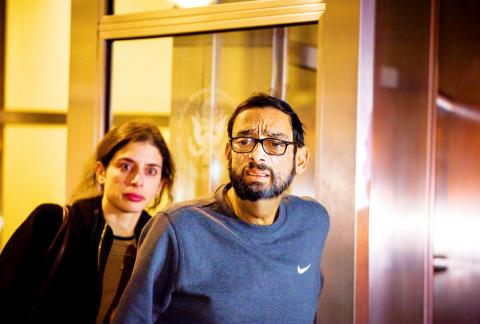Top executives of New York-based hedge fund manager Platinum Partners were arrested on Monday and charged with running a US$1 billion fraud that federal prosecutors said became “like a Ponzi scheme” as its largest investments lost much of their value.
Led by Mark Nordlicht, Platinum was known for years for producing exceptionally high returns — about 17 percent annually in its largest fund — by taking an unusually aggressive approach to investing and fund management, as detailed by a Reuters special report in April.
Nordlicht, Platinum’s founding partner and chief investment officer, was arrested at his home in New Rochelle, New York.

Photo: Bloomberg
Federal prosecutors accused him and six others of participating in a pair of schemes to defraud investors.
“The charges ... highlight the brazenness and the breadth of the defendants’ lies and deceit,” US Attorney Robert Capers told reporters.
Capers added that the case was one of the largest and “most brazen” investment frauds ever and Platinum was ultimately exposed to have “no more value than a tarnished piece of cheap metal.”
The US Securities and Exchange Commission announced parallel charges on Monday against the same executives and two Platinum entities for similar civil fraud charges.
A 48-page criminal indictment said that since 2012, Nordlicht and four other defendants defrauded investors by overvaluing illiquid assets held by its flagship Platinum Partners Value Arbitrage funds, mostly troubled energy-related investments.
This caused a “severe liquidity crisis” that Platinum at first tried to remedy through high-interest loans between its funds before selectively paying some investors ahead of others, the indictment said.
“So to some extent, there is a ‘Ponzi-esque’ aspect to this scheme,” Capers said.
Founded in 2003, Platinum until this year had more than US$1.7 billion under management, with more than 600 investors, authorities said.
Some of those investors came from the same New York Jewish community as Nordlicht and other Platinum executives. They have included a charitable trust set up by day-trading pioneer Aaron Elbogen; the Century 21 Associates Foundation, led by department store executive Raymond Gindi and the SFF Foundation, a non-profit controlled by the Schron family, known for its real-estate investments.
Avi Schron declined to comment; Gindi and Elbogen did not immediately respond to requests for comment.
The indictment describes how angry investors sought to take their money out late last year and early this year as Platinum hinted to clients that some assets were in trouble.
It also cites e-mails between Nordlicht and another unnamed executive in which the men discussed fleeing to Israel as pressure on the firm mounted.
Prosecutors said Platinum’s co-chief investment officer David Levy, and former president of the firm’s signature fund Uri Landesman, also participated in the scheme, which prosecutors said allowed Platinum to extract more than US$100 million in fees based on inflated asset values.

SELL-OFF: Investors expect tariff-driven volatility as the local boarse reopens today, while analysts say government support and solid fundamentals would steady sentiment Local investors are bracing for a sharp market downturn today as the nation’s financial markets resume trading following a two-day closure for national holidays before the weekend, with sentiment rattled by US President Donald Trump’s sweeping tariff announcement. Trump’s unveiling of new “reciprocal tariffs” on Wednesday triggered a sell-off in global markets, with the FTSE Taiwan Index Futures — a benchmark for Taiwanese equities traded in Singapore — tumbling 9.2 percent over the past two sessions. Meanwhile, the American depositary receipts (ADRs) of Taiwan Semiconductor Manufacturing Co (TSMC, 台積電), the most heavily weighted stock on the TAIEX, plunged 13.8 percent in

A wave of stop-loss selling and panic selling hit Taiwan's stock market at its opening today, with the weighted index plunging 2,086 points — a drop of more than 9.7 percent — marking the largest intraday point and percentage loss on record. The index bottomed out at 19,212.02, while futures were locked limit-down, with more than 1,000 stocks hitting their daily drop limit. Three heavyweight stocks — Taiwan Semiconductor Manufacturing Co (TSMC, 台積電), Hon Hai Precision Industry Co (Foxconn, 鴻海精密) and MediaTek (聯發科) — hit their limit-down prices as soon as the market opened, falling to NT$848 (US$25.54), NT$138.5 and NT$1,295 respectively. TSMC's

TARIFFS: The global ‘panic atmosphere remains strong,’ and foreign investors have continued to sell their holdings since the start of the year, the Ministry of Finance said The government yesterday authorized the activation of its NT$500 billion (US$15.15 billion) National Stabilization Fund (NSF) to prop up the local stock market after two days of sharp falls in reaction to US President Donald Trump’s new import tariffs. The Ministry of Finance said in a statement after the market close that the steering committee of the fund had been given the go-ahead to intervene in the market to bolster Taiwanese shares in a time of crisis. The fund has been authorized to use its assets “to carry out market stabilization tasks as appropriate to maintain the stability of Taiwan’s

In a small town in Paraguay, a showdown is brewing between traditional producers of yerba mate, a bitter herbal tea popular across South America, and miners of a shinier treasure: gold. A rush for the precious metal is pitting mate growers and indigenous groups against the expanding operations of small-scale miners who, until recently, were their neighbors, not nemeses. “They [the miners] have destroyed everything... The canals, springs, swamps,” said Vidal Britez, president of the Yerba Mate Producers’ Association of the town of Paso Yobai, about 210km east of capital Asuncion. “You can see the pollution from the dead fish.